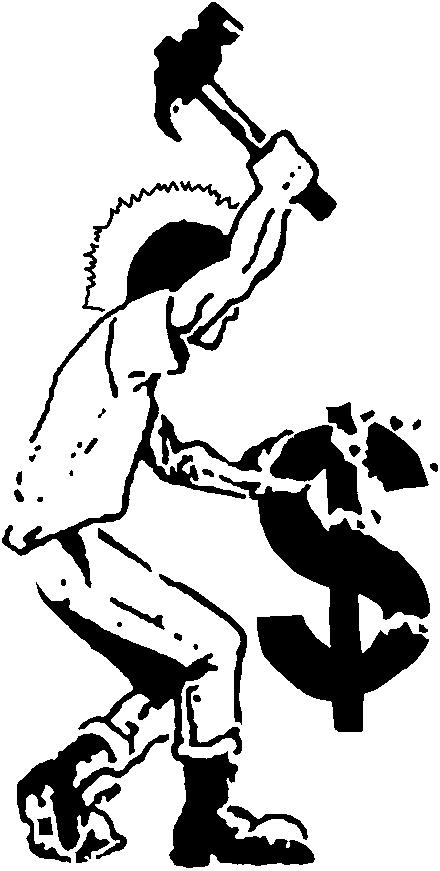|
|||||||||||||
By John Bates Clark Critique by Punkerslut
Introduction In my search for more economic knowledge, I decided to read this work, by John Bates Clark. As it tends to be with older economic works, I find that most of them are objective, hardly taking the side of Communism, Socialism, or Capitalism. Merely, they address the dynamics of private interests within a free (or somewhat limited) system. The reason why so little research and theory has be posed into the results of a Communist economy can clearly be seen: there is only one private interest, that of the collective. However, when I read this work by Clark, not only did I find erroneous and obscure language. But I found that he mercilessly attacked Socialism, or at least I think so. Unlike many other works to attack the idea of collective economics, this one rather was based entirely on theory, if it may be called that. No evidence is presented. Rather, it's a long run of statements. More often than not, these statements are all backed up with nothing. They're just an assertion. A foundationless argument. Theory without evidence becomes a hypothesis, but Clark asserts it so strongly, that -- regardless if he ends up being right or wrong -- there is no doubt about the damage his reasoning faculties have received, in one way or another. Anyhow, with all that out of the way, I begin my critique of this work by John Bates Clark. I hope it is as enlightening as it is informing. The Cause and Distribution of Wealth
When reading this remarks by Clark, and bearing a full head of knowledge on the statistics of the economy, one really does come to the following question: just how much is theorizing worth? One may come to believe that, though Clark is an "economist" (loosest definition of the word), he has no understanding of the facts of economics. His ideas are so alienating towards logic and evidence, that one may come to believe that he actually lives in another universe, where evidence demonstrates a very different outcome. The statements that Clark makes are as follows: (1) that Capitalism (or the natural working of economic law) gives to the producer what he creates; and (2) laborers are paid what they are worth. To the first statement, I argue that it is an oblivious violation of observed evidence. As any person knows with a simple observation of the mechanics of society, the Capitalist class reserves for themselves a wealth that is beyond the imaginations of their workers. To this statement of Clark, one must examine the cost expenditure of Capitalists. Expenditure of the Merchant Wholesale on workers amounted to 53%, Retail Trade at 54%, Business Services at 59%, Health Services at 61%, and Legal Services at 60% (statistics count payroll and fringe benefits). [Source: Source: Business Expenses, 1997 Economic Census, Company Statistic Series, 1997, Issued December 2000, EC97CS-8, US CENSUS BUREAU, U.S. Department of Commerce, Economics and Statistics Administration, U.S. CENSUS BUREAU.] Roughly, half, or a little above half, of all the Capitalist spends goes directly into the pockets of the workers -- the rest goes towards the production of capital, in the form of factories, tools, materials, etc.. If it were true, then, that the profits of a Capitalist go straight to a worker, then that would mean that workers are paid 50% of the wealth they are created, understandably (the other half necessary to their livelihood). However, the mining industry paid its workers 12% of the wealth they created, the construction industry paid 20%, manufacturing industry paid 15%, transportation and public utilities paid 17%, wholesale trade industry paid 5%, retail trade industry paid 11%, and finance, insurance, and real estate industry paid 12%, services (taxable firms) paid 37%. [Source: U.S. Census Bureau, 1997 Economic Census, Comparative Statistics, Core Business Statistics Series, EC97X-C52, issued June 2000.] One must understand, though, that worker compensation accounts for over half of total expenditure. While 37% of finance, insurance, and real estate's expenditure goes towards workers, approximately 37% more goes towards other capital expenditure, amounting towards 74% expenditure with 26% profit. That is the lowest profit among these industries, as the retail trade industry spends a total of 22%, making a 78% profit. There are also factors to consider that may lower the amount actually spent on workers, or the expenditure on capital. CEOs and others who are obviously of the privileged class may sometimes be counted as on the payroll, when their pay check is several hundreds times higher than the individuals whose labor is responsible for all wealth. The first assertion of Clark, that Capitalism gives to the laborer what he produces, is disproven, with little more than a slight investigatory look into the statistics of economy. The second assertion, that laborers are paid what they are worth, is demonstrated as false by the evidence I have hitherto presented above. Conclusion Before closing this critique, there are some extremely serious questions one might ask about the nature of understanding, knowledge, and information. As it can quite clearly be seen, Clark believed in a theory of economy that was in completely opposed to all observable phenomena. Worse yet, he wrote his opinions at the turn of the eighteenth century, a century after the ground-breaking economic work of The Wealth of Nations by Adam Smith. With the vast wealth of economic knowledge that should have been at his disposal, he seemed to ignore completely the conditions of the world in which he lived. Whatever the case may be, there is little doubt that his arguments were ill-founded, that his theory is simply incoherent with any rational understanding, and that the idea of Capitalism producing desirable effects is most depraved of reasoning. Punkerslut,
|



